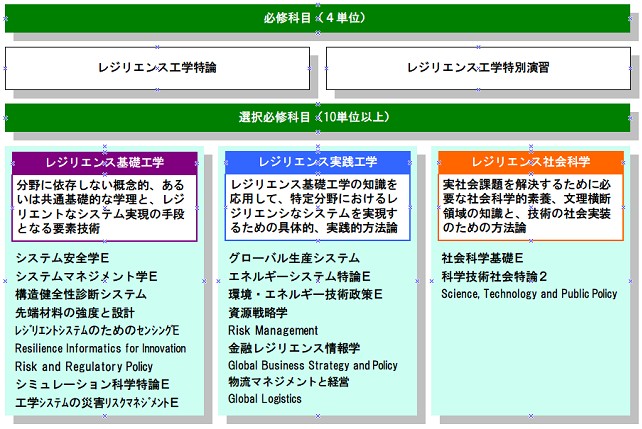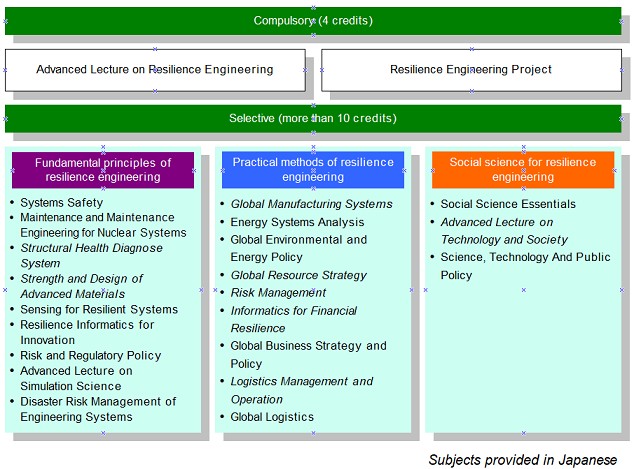はじめに
Message from the faculty
「レジリエンス工学横断型教育プログラム」は、東京大学大学院工学系研究科における初めての専攻横断型教育プログラムとして、平成25年度にスタートしたものです。このプログラムは、工学系の複数の専攻が協力して、領域横断的なレジリエンス工学に関する専門知識と俯瞰的視野を修得し、さまざまな分野で活躍できる人材の育成を目指しています。
これまでは、確率論的リスクの概念に基づくリスクマネジメントが、社会の安全・安心の向上に大きく貢献してきました。しかし、技術社会システムの巨大化、複雑化や、科学技術と社会との相互連関の緊密化とともに、従来のリスクマネジメントの手法では不十分であることが認識されるようになりました。特に、リーマンショックや、東日本大震災を経験した今日、さまざまな分野でリスクマネジメントに対する新しいアプローチが求められています。
以上の背景から、レジリエンスという概念が注目を集めています。レジリエンスとは、外乱やシステム内部の変動がシステムの機能に与える影響を吸収し、状態を平常に保つシステムの能力、あるいは、想定を超えるような外乱が加わった場合であっても機能を大きく損なわない、損なったとしても早期に回復できるシステムの能力を意味します。そのような能力を備えた技術社会システム実現のための学理と方法論に関する分野が、レジリエンス工学です。
レジリエンスは災害や危機への対応力といった意味ばかりでなく、長期にわたるゆっくりとした環境変化にも適応し、生存できるシステムの能力をも意味しています。ですから、変化する社会環境、経済環境の中で、企業がどうやったらイノベーションを継続し、競争力を維持できるかといったこともレジリエンス工学の課題です。
皆さんはそれぞれが所属する専攻での専門教育を受けると思いますが、レジリエンス工学にはそれらの専門性に加えて、より領域横断的な視野と専門性が必要となります。本プログラムは、関連する専門分野の教員が協力して、レジリエンス工学に精通し、複雑な実社会課題の解決能力を有する、これからの社会で求められる人材を育成します。本プログラムが、皆さんのキャリアにプラスになることを確信しております。
Graduate School of Engineering, The University of Tokyo started Transdisciplinary Education Program on Resilience Engineering, which is the first trans-department education program, in April 2013. In collaboration among multiple departments, this program aims at educating talents who have acquired expertise on resilience engineering as well as comprehensive views to make a career in various domains.
The notion of probabilistic risk has contributed greatly to the improvement of safety and security of society so far. As the scale and the complexity of sociotechnical systems have increased and technologies have been tightly coupled with society, people have recognized that the conventional approaches for risk management are insufficient. New approaches for risk management are now desired in various domains, in particular, having experienced the Lehman shock and the Tohoku Earthquake.
From the above background, the notion of resilience is now drawing attention of researchers and practitioners. Resilience is the intrinsic ability of a system to absorb impacts of internal or external disturbances added to the system so that it can sustain the requested functionality or can recover rapidly from damages under both expected and unexpected conditions. Resilience engineering is a field of study where principles and methodologies for realizing such resilient sociotechnical systems are to be sought.
Resilience includes not only the responsiveness to abrupt disasters or crises but also the ability of a system to adapt itself to long-term environmental changes for survival. It is also an issue of resilience engineering, for instance, how an enterprise can continue innovation and keep competitiveness under changing social and economic environment.
Even though each department in Graduate School of Engineering will provide professional education in a separate domain, resilience engineering requires more transdisciplinary views and specialties. Professors from the related departments collaboratively provide this program for educating those who are familiar with resilience engineering so that they are welcomed from society for the ability to resolve realistic issues in complex society. We believe that this program is helpful for you to make a successful career.
カリキュラムと履修の方法
Curriculum and how to take the course
【カリキュラム】
【Curriculum】
カリキュラムは必修科目と選択必修科目で構成されています。レジリエンス工学に共通の基礎学理を学ぶ「レジリエンス工学特論」、「レジリエンス工学特別演習」の2科目が必修科目です。選択必修科目は、以下のような3つの群に分類されています。
The curriculum consists of compulsory and selective subjects. Two subjects that teach the fundamentals common to every application domain of resilience engineering are compulsory: Advanced Lecture on Resilience Engineering and Resilience Engineering Project. The selective subjects are classified into the following three groups.
レジリエンス基礎工学: 分野に依存しない概念的、あるいは共通基盤的な学理と、レジリエントなシステム実現の手段となる要素技術を扱います。
Fundamental principles of resilience engineering: conceptual or fundamental principles independent of application domains, and base technologies for realizing resilient systems.
レジリエンス実践工学: レジリエンス基礎工学の知識を応用して、特定分野におけるレジリエントなシステムを実現するための具体的、実践的な方法論を扱います。
Practical methods of resilience engineering: concrete and practical methodologies for applying the principles of resilience engineering to particular application domains.
レジリエンス社会科学: レジリエンス工学で実社会課題を解決するためには、社会科学的な分野の素養も必要となりますが、そのような文理横断領域を扱います。
Social science for resilience engineering: transdisciplinary areas including social science required for resolving real issues in complex society.
【修了に必要な単位数】
Credit requirements
必修科目4単位、選択必修科目10単位以上(各群から2単位以上)の合計14単位以上を取得しなければなりません。なお、所属専攻の修了に必要な単位と、本プログラム修了に必要な単位とを同一科目で兼ねることが可能です。また、博士課程学生においては、修士課程での該当する既修得科目の単位数を、本プログラム修了に必要な単位数に含めることができます。
It is required to take more than 14 credits for qualification including four credits of the compulsory subjects and more than ten credits of the selective subjects (more than two credits from each of the three groups). These credits in parallel can cover the credit requirements of the department where each student belongs. For doctoral students, the number of credits of those designated subjects taken during the master’s program can be included in the total number of credits required to complete this program.
【プログラム登録手続き】
Enrolment to the program
必修科目を履修する際に、所定の申請用紙に必要事項を記入し、期日までにシステム創成系合同事務室に提出する必要があります。各科目の履修手続きは工学系研究科の定める通常の方法に従い、期日までに履修登録をしてください。
Those who want to be enrolled to the program have to fill in and submit an enrolment form to the department office of Systems Innovation by the assigned due date. Enrolment to each subject is also necessary following the standard enrolment procedure of Graduate School of Engineering.
【単位認定】
Credit approval
各科目の成績評価、単位認定は、科目ごとに行われます。
Grading and credit approval are to be done separately for each subject.
【修了認定】
Qualification
登録申請後、修了要件を充たした者には、プログラムから「レジリエンス工学横断型教育プログラム修了証」が交付されます。
The program will qualify those who have been enrolled and satisfied the credit requirements with a diploma of Transdisciplinary Education Program on Resilience Engineering.
ダウンロードはこちらから
Downloads
ガイダンス資料(pdf)
Program Brochure(pdf)
登録申請書(pdf) 登録申請書(xlsx)
Application Sheet(pdf) Application Sheet(xlsx)
|


